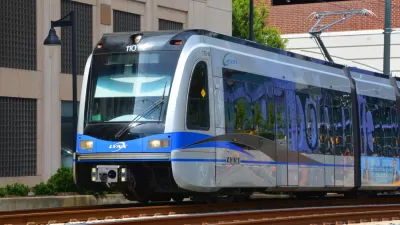Moira Quinn takes a look at Charlotte, North Carolina, where businesses and local government have teamed up to keep office buildings green as the central business district grows.
Over the past two years, a handful of major players in Charlotte have been developing a program intended to "demonstrate its leadership as a sustainable, progressive, cost-efficient place to do business," Quinn writes. Formed by institutions in the public, private, academic, and nonprofit sectors, Envision Charlotte provides building owners with hard data on resource consumption to help steer their tenants toward greener habits.
The first model program within Envision Charlotte, dubbed Smart Energy Now, pools the resources of Verizon, Cisco, and Charlotte-based Duke Energy to monitor energy use in 70 buildings in the Uptown area. Each property owner will receive a report outlining building-specific energy use, and aggregated numbers will be released to the public.
"The information gained will have a profound impact on how a community, property owner, tenant, and individual will view and utilize electricity," said Michael Delev, property manager for a 25-story, Class A office tower located in Uptown.
Smart Energy Now includes commercial spaces as small as 10,000 square feet. "Individual building owners have the ability to make an impact in our community in a significant way," said property owner and businessman Dan Roselli. "Taking a building built in 1928 as a parking garage and turning it into a LEED building shows that every building has the potential to decrease its environmental footprint.
Model programs monitoring water usage, waste, and air quality are soon to come.
FULL STORY: Envision Charlotte

Alabama: Trump Terminates Settlements for Black Communities Harmed By Raw Sewage
Trump deemed the landmark civil rights agreement “illegal DEI and environmental justice policy.”

Planetizen Federal Action Tracker
A weekly monitor of how Trump’s orders and actions are impacting planners and planning in America.

The 120 Year Old Tiny Home Villages That Sheltered San Francisco’s Earthquake Refugees
More than a century ago, San Francisco mobilized to house thousands of residents displaced by the 1906 earthquake. Could their strategy offer a model for the present?

In Both Crashes and Crime, Public Transportation is Far Safer than Driving
Contrary to popular assumptions, public transportation has far lower crash and crime rates than automobile travel. For safer communities, improve and encourage transit travel.

Report: Zoning Reforms Should Complement Nashville’s Ambitious Transit Plan
Without reform, restrictive zoning codes will limit the impact of the city’s planned transit expansion and could exclude some of the residents who depend on transit the most.

Judge Orders Release of Frozen IRA, IIJA Funding
The decision is a victory for environmental groups who charged that freezing funds for critical infrastructure and disaster response programs caused “real and irreparable harm” to communities.
Urban Design for Planners 1: Software Tools
This six-course series explores essential urban design concepts using open source software and equips planners with the tools they need to participate fully in the urban design process.
Planning for Universal Design
Learn the tools for implementing Universal Design in planning regulations.
Clanton & Associates, Inc.
Jessamine County Fiscal Court
Institute for Housing and Urban Development Studies (IHS)
City of Grandview
Harvard GSD Executive Education
Toledo-Lucas County Plan Commissions
Salt Lake City
NYU Wagner Graduate School of Public Service





























